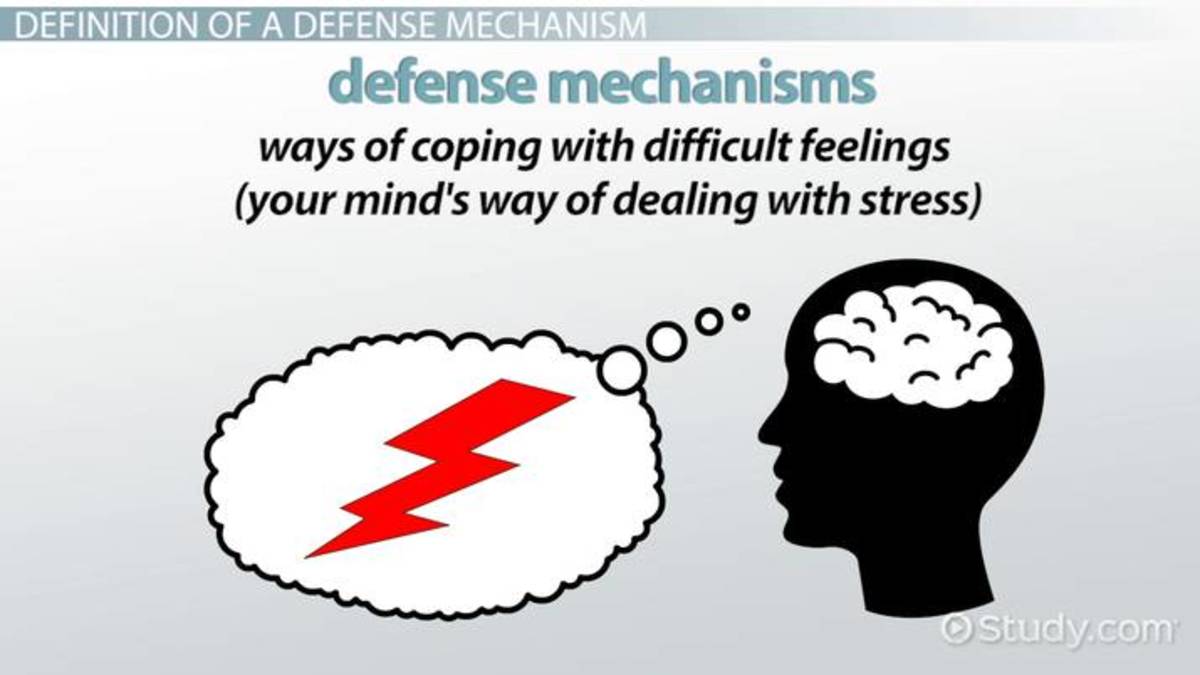What Is a Defense Mechanism

Why We Resort to the Use of Defense Mechanisms
What is a defense mechanism? According to social Psychologists, there are moments when we are faced with severe inner conflicts that cause us to experience an extraordinary level of life-threatening anxiety. The ego, which is that rational part of the personality, often tries to keep the anxiety at a minimal level by means of irrational techniques known as defense mechanisms. Below is a list of the common defense mechanisms:
- Repression
- Rationalization
- Sublimation
- Denial
- Progression
- Regression
- Displacement
- Reaction formation
Repression
This is the fundamental defense mechanism that keeps threatening thoughts and memories from penetrating consciousness by pushing them back into the unconscious(thoughts and memories are buried in the unconscious). For example, a person might be unable to recall a traumatic childhood event without considerable probing. This is due to fact that this psychologically damaging memory is usually hidden from the consciousness by strong forces.
Rationalization
Rationalization -- a familiar, extremely common defense mechanism -- is one in which we give ourselves an apparently fair explanation for doing(or not doing ) something that we are in fact doing (or not doing), for quite different reasons. We may not be aware of the real reason for our behavior, or the real reason may be unacceptable to us. For example, we may justify our reason for not helping out an homeless person on the street who asks us for money by telling ourselves that he would only spend it on alcohol or other drugs. This allows us to avoid the quilt we might experience if we thought we had refused to help a person who was well deserving of the help.
Sublimation
When an individual diverge erotic energy away from its original source and direct it towards a socially constructive activity this is called sublimation. Famous Psychologist - Sigmond Freud, for example, believed that Leonardo da Vinci’s urge to paint Madonnas was a sublimate repression of his longing to be reunited with his mother, from whom he had been separated at a rather early age.
Denial
This is the act of refusing to recognize a threatening source of anxiety. Say for example, a student with a failing academic record wants to become a doctor, he might deny the importance of good grades and assert that somehow it will all work out, just to avoid worrying.This is an example of denial.
Projection
With projection, the individual turns an inward threat into a threat from the external world. If a woman for example, feels an impulse to shoplift, she may begin to develop fair that her own purse will be stolen or that retail store cashiers may shortchange her.
Regression
This is when a person returns to an earlier, less threatening stage of development in response to some perceived threat. Many people usually overeat to distract themselves from their anxieties. Others may return to a comforting behavior that gives them pleasure during childhood. A child may start sucking her thumb on the first day of school (a habit abandoned years ago), simply because she was scared. These two situations are both examples of regression.
Displacement
With displacement, the reality is that the individual is transferring emotions that he/she is afraid to feel or express to a non-threatening situation. For example, a man who might be angry with his boss may come home and start to verbally abuse his wife.
Reaction Formation
A man for example, who is interested in becoming a firefighter, may start fires and spend his time trying to extinguish them. Likewise, a father who resents his daughter may shower her with expressions of love. These examples of the defense mechanism refer to as reaction formation. The reality here in both cases is that both men are replacing an anxiety-producing impulse or feeling.
Social psychologists believe defense mechanisms occasionally may serve a useful purpose, because they relieve minor anxieties and allow us to meet the demands of daily life. Yet, they all misrepresent reality, and as a result, may impair our ability to cope with things as they are in the real world.
The parents of a mentally retarded child who persuade themselves that the child’s inability to speak is due to shyness, for example, may deprive their child of months or even years of professional help that might have increased his or her ability to function optimally.
Conclusion
In our daily lives we are often faced with inner conflicts that can create a tremendous amount of anxiety. The energy that is often required to deal with this level of anxiety is so great at times, that we often find ourselves consciously, but for the most part, unconsciously resorting to one or more of the above defense mechanisms, as a way of reducing the level of anxiety.








